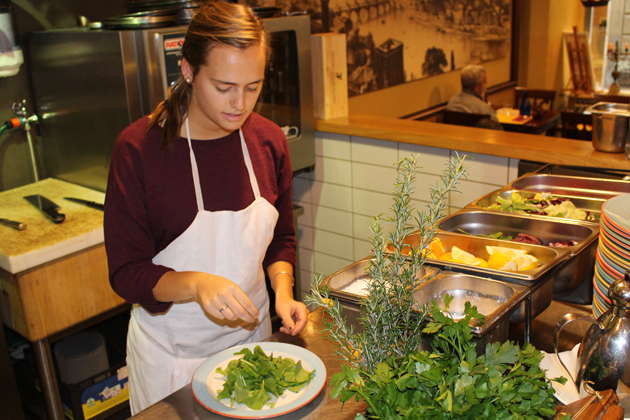
Students enrolled in the Sustainable Food and Environmental Systems Program based in Florence, Italy during the fall semester, had a lot of reasons for choosing the program. Among them were a chance to experience Tuscany’s rich culture, an opportunity to use newly acquired Italian language skills when communicating with their hosts, and the chance to enjoy the fruits of this agricultural region known both for culinary excellence and bountiful vineyards.
Maureen Megson ’15 (CAHNR) is an allied health major with a strong interest in nutrition and learning about how food is produced ‘from farm to fork.’ “I thought this program would be a fun way to learn,” she says, “while also eating my way through Tuscany.”
This year’s cohort comprised eight students from UConn, and nine others from Penn State, the University of Virginia, and Connecticut College.

The program is tailored to undergraduates who are interested in agricultural production and other sustainability issues. It also welcomes those with other, diverse interests in the areas of social, cultural, political, ecological, and economic issues broadly related to food and the environment.
Cameron Faustman, a professor of animal science and associate dean of the College of Agriculture, Health, and Natural Resources (CAHNR), is a strong proponent of Education Abroad. “Whether it’s for a whole semester or a summer program or for just a few weeks, students come back from these experiences with a broader world view and a different way of looking at other cultures,” he says. “The program in Tuscany just reinforces the value of this experience. ”
For the second year in a row, required reading for this year’s program was The Omnivore’s Dilemma, Michael Pollard’s book reflecting on America’s way of eating. By coincidence, this book was chosen as this year’s selection for UConn Reads.
Faustman, who spent part of the semester teaching in Italy, says the choice was serendipitous, but Pollard’s book “fits like a glove.”
The students also had other required reading, including portions of Jason Lusk’s Food Police, which delves into issues of food production and consumption from an economic perspective and often contradicts Pollard’s locavore attitude.
“There was lots of food for thought during the semester,” says Faustman.

Austin Vitelli ’16 (CAHNR), a horticulture major, says reading The Omnivore’s Dilemma greatly influenced the way he sees things. “I appreciate food more, and I’m questioning where it comes from and how it’s produced.”
He says the program as a whole gave him an awareness of how much work still needs to be done if humans are to live in a sustainable world: “Getting to see how food is produced in Italy has been eye opening. I talked to the locals, made friends, and I felt as if I was truly part of the community.”
In addition to academics, which included the study of the Italian language, students had a variety of ‘hands on’ opportunities.
Among their experiences was rising in the light of early morning to get to the market stalls at the Mercato di Sant’Ambrogio, where they worked side-by-side with vendors selling meat, fresh fish, and vegetables; waiting tables and helping with meal preparation at several restaurants throughout Florence; and taking the bus to the Mensa Caritas soup kitchen run by a Catholic charity through the Diocese of Florence, where students helped prepare and serve food. Some early risers visited the Central Florence Mercafir (a wholesale food market) at 3 a.m. to get an inside look at how perishable food is prepared for delivery.
A different way of shopping

Megson says what surprised her most during her stay is how many local farms and small-scale producers there are in the area:
“We have visited so many vineyards and farms that are producing fresh and sustainable products. It is so different from the United States. There are no Stop & Shops selling every single ingredient you could ever imagine. Instead, the culture here is to buy fresh and local products that you seek out at different stores. It’s a very different way of shopping for food.”
One of the most popular experiences for the students was a visit to a biodynamic organic vineyard. Biodynamic farming looks at agricultural production from a holistic point of view, where each farm is viewed as its own ecosystem.

During this field trip, the class helped harvest grapes and watched them go through the de-stemming machine.
“We even had the chance to stomp on the grapes with our bare feet!” said Berett Garbus ’16 (CAHNR), a natural resources and the environment major. “We watched the whole process of wine making and then ended the day with a delicious classic Tuscan lunch. Trips like this made my time in Italy very special. This was a once-in-a-lifetime experience.”
This is the type of reaction that those involved in Education Abroad hope for: “In my 26 years of teaching at UConn, I would say the most transformational experience I have seen students participate in is [Education] Abroad,” says Faustman.
He says it also benefits faculty who participate. UConn has an arrangement with the International Studies Institute in Florence that provides the program with an apartment, and CAHNR faculty rotate in to teach in three- or four-week increments throughout the semester.
“Although what they teach is in their area of expertise, the faculty members are also exposed to cultural differences and opportunities that improve and inform the way they do things when they come back to Storrs,” says Faustman. “Teaching abroad is almost like what a sabbatical is intended to do for research scientists, albeit for a much shorter timeframe. It broadens horizons and opens up new perspectives.”



